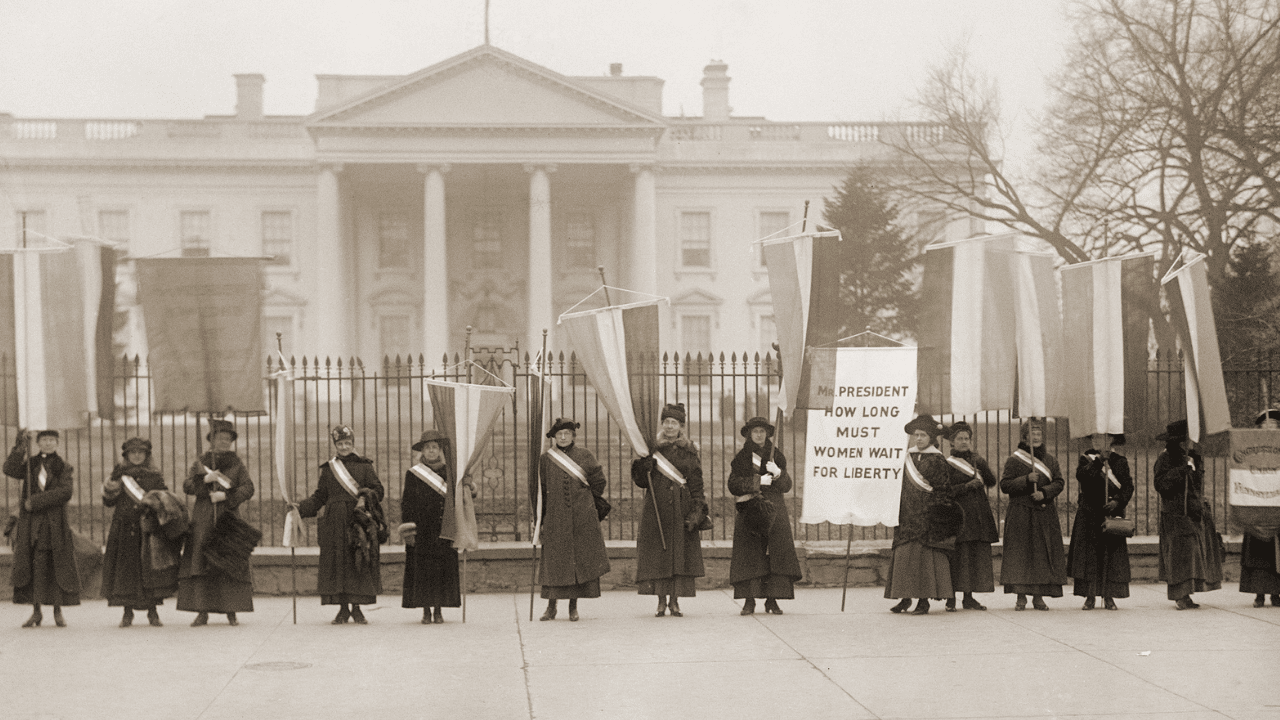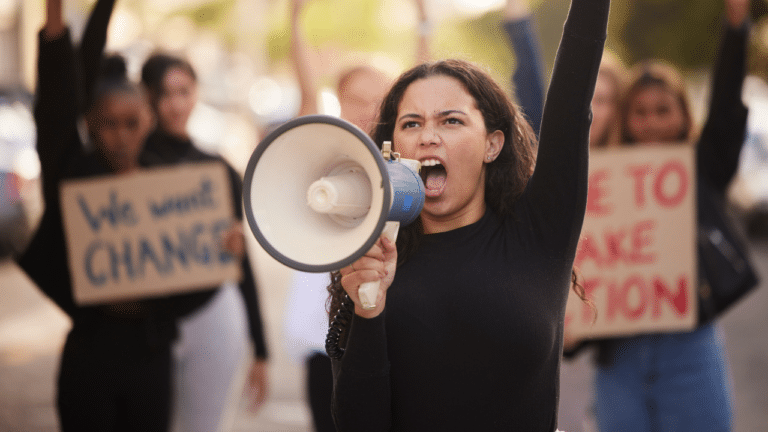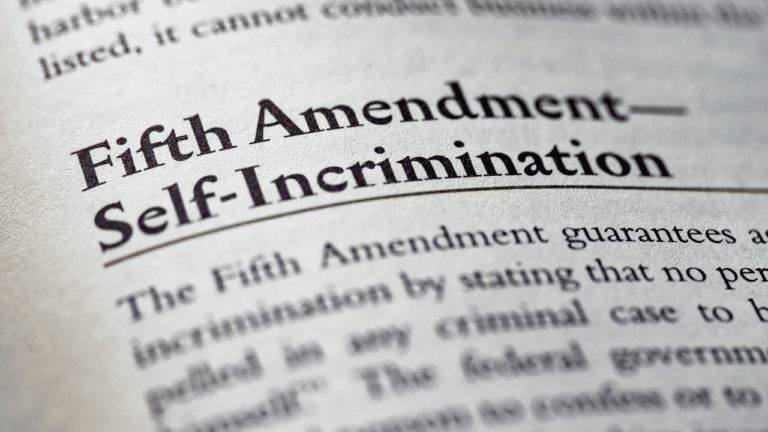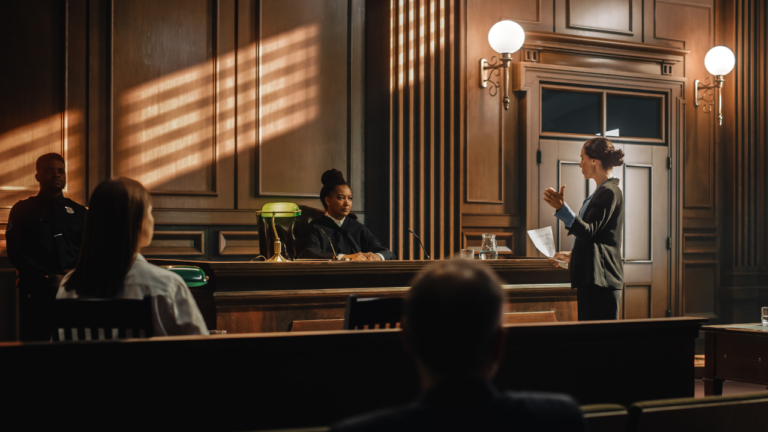The Nineteenth Amendment to the Constitution of the United States granted women the right to vote.
WHAT IS THE TEXT OF THE NINETEENTH AMENDMENT TO THE CONSTITUTION?
U.S. Const. Amend. XIX. The right of citizens of the United States to vote shall not be denied or abridged by the United States or by any State on account of sex.
Congress shall have power to enforce this article by appropriate legislation.
WHAT IS THE HISTORICAL ORIGIN OF THE NINETEENTH AMENDMENT?
The origin of women’s suffrage can be traced to abolitionism, as many of the same people who were against slavery also supported a woman’s right to vote and other women’s rights. During the 1837 First Anti-Slavery Convention of American Women, about two hundred black and white women called for women’s rights. The push for women’s suffrage in the United States was also influenced by the women winning the right to vote in national elections in various countries such as Australia, New Zealand, Finland, and Norway.
That being said, female abolitionists speaking about women’s suffrage were still met with criticism. When female delegates were banned from speaking at London’s World Antislavery Congress in 1840, two delegates, Elizabeth Cady Stanton and Lucretia Mott, decided to hold a women’s rights convention, which only came to fruition eight years later. These women would become notable figureheads of the cause.
Why Weren’t Women Allowed to Vote?
The reasons why women were denied the right to vote mainly stemmed from sexist and misogynist viewpoints. Some believed that women were too delicate to be exposed to the rough nature of politics, while others felt that women weren’t intelligent enough to make difficult decisions. But one of the oddest reasons people didn’t think women should be allowed to vote were based on highly inaccurate notions of human biology. During the 19th and early 20th century, people thought that the human body had a finite amount of energy. In the case of women, it was believed that their energy should be focused on their reproductive system. Therefore suffrage was considered harmful to a woman if she was menstruating, pregnant, or even menopausal.
Men weren’t the only ones who didn’t advocate for women’s suffrage. Women with more conservative values considered the notion of women having equal rights to men as being unladylike and improper. The late 1800s and 1900s saw a wave of social reform, and women with beliefs in traditional gender roles felt threatened by this change.
What is the Seneca Falls Convention?
The Seneca Falls Convention of 1848 is often credited with formally announcing the women’s suffrage movement. It was organized by five women, all of whom were also abolitionists and included Stanton and Mott. Interestingly enough Susan B. Anthony, who would later become one of the most prominent figures in the women’s suffrage movement, was not present at the convention. She and Stanton would meet and work together several years later.
During the convention, Stanton unveiled the Declaration of Sentiments, which was modeled after the Declaration of Independence. It listed 15 grievances that criticized the patriarchal society and men. In addition to being denied the right to vote, the convention leaders accused men of denying women the right to own property, the right to higher education, and overall rights as an individual. It also covered gender inequality in terms of jobs, wages, and divorce situations. The Declaration of Sentiments was signed by Stanton and the other four organizers, but also male suffragists such as Fredrick Douglass.
The organizers also produced a set of resolutions that called for women to receive equal treatment with men. At first, all but one resolution was unanimously adopted by the event attendees—that being the women’s right to vote. However, when Douglass spoke at the convention on the second day, it was said that his support provided that extra push to endorse that remaining resolution.
How did the Fifteenth Amendment Affect the Suffrage Movement?
The Fifteenth Amendment to the United States Constitution was ratified in 1870. It stated that the right to vote cannot be denied “regardless of race, color, and condition of servitude”. Although this was great news to black men, some female suffragists felt it was unacceptable that black men were granted voting rights before white women. Former allies suddenly became opponents. Douglass insisted that black men needed to be prioritized because of the violence they faced against white supremacists. Meanwhile, Stanton and Anthony countered with a litany of racist reasons, arguing that “educated” white women deserve the right to vote before black men, who they considered ignorant and incompetent to understand the complexities of politics. This caused the women’s rights movement to split. It has been said that this division in beliefs delayed women’s suffrage by many years.
The Struggle to Achieve Voting Rights
The road to women’s suffrage continued to be tumultuous. In 1878, a constitutional amendment extending voting rights to women was first presented to Congress, which failed, and again in 1914. However, the suffragists pushed on with marches, protests, and parades while enduring arrests and beatings. The movement was then dealt a severe blow with the deaths of major suffragist leaders Stanton (1902) and Anthony (1906). At the same time, progress was being made. General interest in women’s suffrage at the state level was steadily increasing. By 1918, 17 states including California, Illinois, Indiana, New York, and Washington granted women the right to vote.
In 1918, the constitutional amendment was again presented to Congress. Despite overwhelming support even from President Woodrow Wilson himself, the amendment still failed, barely passing in the House of Representatives and failing in the Senate. A year later, the amendment fully passed, with the House at 304-89, and the Senate at 56-25. The Nineteenth Amendment would be ratified in 1920, barely meeting the three-fourths of the states needed for ratification.
WHAT DOES THE NINETEENTH AMENDMENT DO?
The Nineteenth Amendment extended voting rights to women.
Did the Nineteenth Amendment Allow all Women to Vote?
A major misconception of the Nineteenth Amendment is that it immediately granted all women the right to vote. The truth is that the Nineteenth Amendment really only applied to white women.
The amendment specifically mentions that citizens will not be denied the right to vote regardless of sex. However, at the time it was ratified, only white women were considered American citizens.
Black women were not covered by the Fifteenth Amendment. Other women of color such as Native Americans and Latinas were not considered citizens, which is ironic for the former since early suffragist leaders were heavily influenced by certain Native American tribes that featured women having equal rights. Meanwhile, Asian American women were prevented from obtaining citizenship due to the Chinese Exclusion Act of 1882 and various other immigration acts in the early 20th century.
Thus, American women of color were left behind to fight their own battles in achieving voting rights over the next several decades.
NINETEENTH AMENDMENT TO THE UNITED STATES CONSTITUTION
The Nineteenth Amendment stemmed from the demand for equal rights for women, reflecting the rise of social reform and change in the United States during the early 20th century. It was groundbreaking in that it granted women the right to vote. However, for many years the amendment only benefitted white women, as women of color were not considered citizens or were denied citizenship. Black men were granted the right to vote with the Fifteenth Amendment, but that right was not extended to black women. It would take severe changes in the law, such as the creation of the Voting Rights Act of 1965, for the Nineteenth Amendment to benefit all women.
NINETEENTH AMENDMENT COURT CASES
The United States Supreme Court has rarely interpreted and applied the Nineteenth Amendment since its adoption in 1920. The earliest court case was two years after the amendment had passed.
- In Leser v. Garnett, Maryland resident Oscar Leser sued to remove women from voting registers in his state. He argued that the state constitution had granted the right to vote only to men and the Nineteenth Amendment was infringing on states’ rights, since the Maryland legislature had refused to ratify the amendment. Specifically, Leser argued that the state of Maryland did not consent to the suddenly large influx of voters. The Supreme Court countered that the Nineteenth Amendment was written similarly to the Fifteenth Amendment, and that the Fifteenth has been valid for the last 50 years in spite of six states (Maryland is one of them) objecting to it. Therefore, the Nineteenth Amendment has the same validity.
- In Breedlove v. Suttles, 28-year-old Nolan Breedlove refused to pay Georgia’s poll tax of $1.00 and was not allowed to register to vote. At the time, Georgia’s poll tax targeted all citizens between the ages of 21-60, and exempted women who did not register to vote. Breedlove filed a lawsuit, arguing that the poll tax defied the Fifteenth and Nineteenth Amendments. The Supreme Court ruled to uphold the Georgia law and in terms of the Nineteenth Amendment, stated that its purpose is not to regulate the levy or collection of taxes, but to grant the right to vote to all U.S. citizens regardless of gender.














